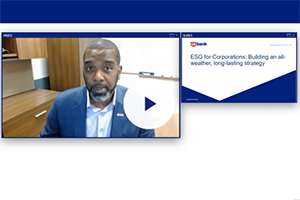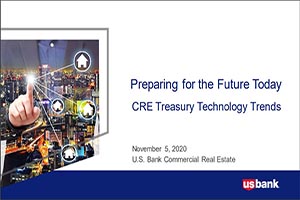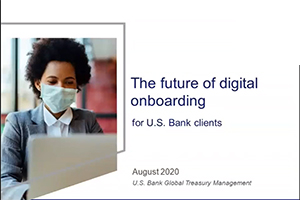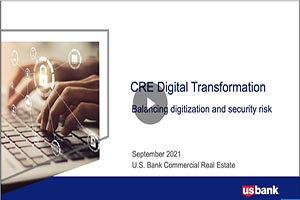
Putting home ownership within reach for a diverse workforce

Administrator accountability: 5 questions to evaluate outsourcing risks

Commercial real estate in 2020: Keeping up with the pace of change

The startup scene in Reno: The story of Breadware

The startup scene in Reno: Emerging tech leads the way

For small business growth, consider the international market

Finance or operating lease? Deciphering the legalese of equipment finance

Common pitfalls to avoid in the equipment financing process

Buying or leasing? Questions to ask before signing a contract

High-yield bond issuance: 5 traits lawyers should look for in a service provider

Easier onboarding: What to look for in an administrator

3 tips to maintain flexibility in supply chain management

The secret to successful service provider integration

Insource or outsource? 10 considerations

Refining your search for an insurance custodian

4 questions you should ask about your custodian

Webinar: ESG for Corporations: Building an all-weather, long-lasting strategy

Preparing for your custodian conversion

Service provider due diligence and selection best practices

Tactical Treasury: Fraud prevention is a never-ending task

Webinar: Empower your AP automation with strategic intelligence

Evaluating interest rate risk creating risk management strategy

Webinar: AP automation—solve payment challenges with an invoice-to-pay solution

Webinar: CRE technology trends

Webinar: The future of digital onboarding for U.S. Bank clients

Complying with changes in fund regulations

Business risk management for owners of small companies

Webinar: CSM corporation re-thinks AP

Adjust collections to limit impact of USPS delivery changes

Tech tools to keep your restaurant operations running smoothly

Unexpected cost savings may be hiding in your payment strategy

Addressing financial uncertainty in international business

Webinar: AP automation for commercial real estate

The benefits of payment digitization: Pushing for simplicity

COVID-19 safety recommendations: Are you ready to reopen?

5 winning strategies for managing liquidity in volatile times

Safeguarding the payment experience through contactless

Artificial intelligence in finance: Defining the terms

The future of financial leadership: More strategy, fewer spreadsheets

Choosing your M&A escrow partner

Digital banking and cloud accounting software: How they work together

Employee benefit plan management: trustee vs. custodian

Why retail merchandise returns will be a differentiator in 2022

High-cost housing and down payment options in relocation

The client-focused mindset: Adapting to differing personality types

Save time with mobile apps for business finances

The client-focused mindset: How to network effectively

The client-focused mindset: What do clients expect?

Automated escheatment – learn how to prevent and resolve unclaimed property

Webinar: CRE Digital Transformation – Balancing Digitization with cybersecurity risk

Webinar: Reviving mobility, what to expect

ABCs of ARP: Answers to American Rescue Plan questions for counties

Webinar: DEI tips for transforming your mobility program

For today's relocating home buyers, time and money are everything

5 steps to take before transitioning your business

How to sell your business without emotions getting in the way

10 tips on how to run a successful family business

Crypto + Relo: Mobility industry impacts

Empowering team members

The moment I knew I’d made it: The Cheesecakery

How entrepreneurs can plan for what matters most

Making the leap from employee to owner

Making a ‘workout’ work out as a business

How I did it: Grew my business by branching out

How a bright idea became a successful business (in Charlotte, North Carolina)

Mapping out success for a small-business owner

Tools that can streamline staffing and employee management

Business tips and advice for Black entrepreneurs

How iPads can help increase efficiency in your salon

How I did it: Turned my side hustle into a full-time job

Talent acquisition 101: Building a small business dream team

Planning for restaurant startup costs and when to expect them

Make your business legit

Opening a business on a budget during COVID-19

How to identify what technology is needed for your small business

How to test new business ideas

How to establish your business credit score

How to get started creating your business plan

How to redefine challenges with business collaboration

8 ways to increase employee engagement

The role of ethics in the hiring process

Costs to consider when starting a business

What is needed to apply for an SBA loan

The costs of hiring a new employee

How to hire employees: Employee referral vs. external hiring

Tips for building a successful customer loyalty program

Give a prepaid rewards card for employee recognition

Checklist: Increase lead generation with website optimization

How to reward employees and teams who perform well

5 steps for creating an employee recognition program

How small businesses are growing sales with online ordering

Gift cards can extend ROI into 2022

Omnichannel retail: 4 best practices for navigating the new normal

Is your restaurant Google-friendly?

How to expand your business: Does a new location make sense?

3 simple brand awareness tips for your business

How a small business owner is making the workplace work for women

What you should know about licensing agreements

6 common financial mistakes made by dentists (and how to avoid them)

The growing importance of a strong corporate culture

7 uncommon recruiting strategies that you may not have tried yet

How increased supply chain visibility can combat disruptors

Business credit card 101

How to apply for a business credit card

What kind of credit card does my small business need?

Using merchant technology manage limited staffing

Meet your business credit card support team

Do I need a credit card for my small business?

How this photography business persevered through tough times

Prioritizing payroll during the COVID-19 pandemic

How jumbo loans can help home buyers and your builder business

5 questions business owners need to consider before taking out a loan

8 Ways for small business owners to manage their cash flow

Break free from cash flow management constraints

How to establish your business credit score

When small business and community work together

How tenacity brought Taste of Rondo to life

5 tips for managing your business cash flow

How Gentlemen Cuts helps its community shine

How running a business that aligns with core values is paying off

Meet the Milwaukee businessman behind Funky Fresh Spring Rolls

How a family-owned newspaper is serving its community

Improve online presence your business

Community behind Elsa’s House of Sleep

How Shampoo’ed is transforming hair and inspiring entrepreneurs

The San Francisco bridal shop that’s been making memories for 30 years

Honey Luxury Beauté: growing a side project into an eye-catching beauty business

How Al’s Breakfast is bringing people together

Celebrity Cake Studio’s two decades of growth and success

How Lip Esteem is empowering women

In a digital world, Liberty Puzzles embraces true connection

How a bar trivia company went digital during COVID-19

How a travel clothing retailer is staying true to its brand values

How community gave life to lifestyle boutique Les Sol

How a group fitness studio made the most of online workouts

Community and Coffee: How one small business owner is breaking down barriers

How to build a content team

How Wenonah Canoe is making a boom in business last

How (and why) to get your business supplier diversity certification

Use this one simple email marketing tip to increase your reach

Multigenerational household financial planning strategies

How to manage money tips

LGBTQ+ financial planning tips

5 financial goals for the new year

Year-end financial checklist

How to track your spending patterns

How to manage your money: 6 steps to take

Do I need a financial advisor?

How to manage your finances when you're self-employed

Reviewing your beneficiaries: A 5-step guide

Good debt vs. bad debt: Know the difference

4 reasons estate planning is important

How to talk about money with your family

Financial steps to take after the death of a spouse

6 tips for trust fund distribution to beneficiaries

How to protect your digital assets in your estate plan

Estate planning documents: Living trusts vs. will vs. living will

4 tips to help you save for retirement in your 20s

How to build wealth at any age

Retirement income planning: 4 steps to take

5 unexpected retirement expenses

How to retire happy

Retirement planning in the gig economy

Key milestone ages as you near and start retirement

Retirement planning strategies for dual-income families

Preparing for retirement: 8 steps to take

LGBTQ+ retirement planning: What you need to know

The connection between your health and financial well-being

7 things to know about long-term care insurance

8 steps to choosing a health insurance plan

Is a Health Savings Account missing from your retirement plan?

3 types of insurance you shouldn’t ignore

What is Medicare? Understanding your coverage options

Working after retirement: Factors to consider

4 steps to finding a charity to support

7 year-end tax planning tips

Should I itemize my taxes?

Economic forecast for 2023: 3 things to know

Do your investments match your financial goals?

Investment strategies by age

Can fantasy football make you a better investor?

What types of agency accounts are available for investors?

A beginner's guide to investing

Tips for navigating a medical hardship when you’re unable to work

How to plan and save for adoption and in vitro fertility treatment costs

11 essential things to do before baby comes

Closing on a house checklist for buyers

Checklist: 10 questions to ask your home inspector

What you need to know as the executor of an estate

What documents do you need after a loved one dies?

Resources for managing financial matters after an unexpected death

Student checklist: Preparing for college

Webinar: Uncover the cost: College diploma

How I did it: Paid off student loans

Webinar: Bank Notes: College cost comparison

Annual insurance review checklist

From LLC to S-corp: Choosing a small business entity

6 pandemic money habits to keep for the long term

Friction: How it can help achieve money goals

Your 4-step guide to financial planning

How I did it: Learned to budget as a single mom

What military service taught me about money management

Webinar: Uncover the cost: Wedding

Webinar: Uncover the cost: International trip


Adulting 101: How to make a budget plan

How having savings gives you peace of mind

Allowance basics for parents and kids

Personal loans first-timer's guide: 7 questions to ask

Tips to overcome three common savings hurdles

3 awkward situations Zelle can help avoid

Helpful tips for safe and smart charitable giving

Webinar: Mindset Matters: How to practice mindful spending

How to save money while helping the environment

How can I help my student manage money?

U.S. Bank asks: Do you know your finances?

Do you and your fiancé have compatible financial goals?

U.S. Bank asks: Transitioning out of college life? What’s next?

Which is better: Combining bank accounts before marriage — or after?

Personal finance for teens can empower your child

Don’t underestimate the importance of balancing your checking account

9 simple ways to save

Is it time to get a shared bank account with your partner?

How to save for a wedding

It's possible: 7 tips for breaking the spending cycle

Here’s how to create a budget for yourself

Multiple accounts can make it easier to follow a monthly budget

7 steps: How couples and single parents can prepare for child care costs

5 reasons why couples may have separate bank accounts

Dear Money Mentor: How do I set and track financial goals?

Tips for working in the gig economy

Lost job finance tips: What to do when you lose your job

Money management guide to financial independence

Money Moments: 8 dos and don’ts for saving money in your 30s

5 tips to use your credit card wisely and steer clear of debt

30-day adulting challenge: Financial wellness tasks to complete in a month

Money Moments: 3 smart financial strategies when caring for aging parents

7 financial questions to consider when changing jobs

Money Moments: How to manage your finances after a divorce

What’s in your emergency fund?

Travel for less: Smart (not cheap) ways to spend less on your next trip

Real world advice: How parents are teaching their kids about money

How to stop living paycheck to paycheck post-pay increase

Practical money tips we've learned from our dads

How to cut mindless spending: real tips from real people

6 ways to spring clean your finances and save money year-round

What you need to know about renting

What financial advice would you give your younger self?

Understanding guardianship and power of attorney in banking

Building a financial legacy for your family and community

How to increase your savings

Financial gifts can be a valuable – and fun – choice for the holidays

It’s time for a fresh start: A new way of thinking

How to open and invest in a 529 plan

Your financial aid guide: What are your options?

Parent checklist: Preparing for college

How grandparents can contribute to college funds instead of buying gifts

Using 529 plans for K-12 tuition

How to apply for federal student aid through the FAFSA

Be careful when taking out student loans

5 tips to use your credit card wisely and steer clear of debt

How to use debt to build wealth

7 steps to keep your personal and business finances separate

For today's homebuyers, time and money are everything

Should you buy a house that’s still under construction?

Crypto + Homebuying: Impacts on the real estate market

House Hacks: How buying an investment property worked as my first home

Your guide to breaking the rental cycle

Webinar: Uncover the cost: Building a home

Military homeownership: Your guide to resources, financing and more

How I did it: Bought a home without a 20 percent down payment

Home buying myths: Realities of owning a home

Money Moments: Tips for selling your home

4 ways to free up your budget (and your life) with a smaller home

10 ways to increase your home’s curb appeal

10 questions to ask when hiring a contractor

Beyond the mortgage: Other costs for homeowners

5 things to avoid that can devalue your home

How to spot a credit repair scam

Webinar: Uncover the cost: Home renovation

5 unique ways to take your credit card benefits further

Car shopping: Buying versus leasing your next vehicle

How to winterize your vehicle

Questions to ask before buying a car

What you should know about buying a car


